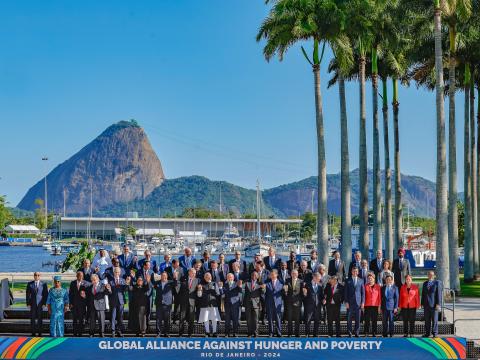Ground-breaking alliance aims to fast-track an end to hunger and poverty

- In 2023, around 733 million people in the world faced hunger.
- It is estimated that US$7 billion are required each year to end malnutrition
- The number of people facing acute hunger reached a historic high in 2023: 281.6 million in 59 countries. 36 million people in 39 countries were on the brink of famine.
- Nearly half of all deaths in children under age 5 are a result of undernutrition.
- More than half (56%) of children under age 5 globally (372 million) suffer from micronutrient deficiencies.
Sao Paulo, Brazil, Nov 19, 2025. More than 145 countries, regional bodies, and international organisations have joined forces in an unprecedented partnership to fast-track global efforts to end hunger and poverty. The Global Alliance Against Hunger and Poverty was officially launched today at the G20 Leaders’ Summit in Rio de Janeiro following a year-long process of dialogue and collaboration led by Brazil as the G20 President.
The Alliance begins with 147 founding members, including the African Union, the European Union, 24 international organisations, 9 international financial institutions, and 31 philanthropic and non-governmental organisations. Governments from 81 countries have also joined the Alliance, representing more than 40% of UN member states. More countries are expected to join, with Brazil anticipating the total number will approach 100. Twenty out of 21 G20 members have joined.
It is estimated that U$7 billion are required each year to end malnutrition. International humanitarian and development agency, World Vision, one of the NGOs in the Alliance and a founding member, committed U$3.4 billion in funds to be allocated globally between 2023 and 2026 to end hunger and malnutrition.
“The launch of the Alliance is huge step. Now that commitments have been made, we expect swifter actions and better coordination, under the competent leadership of Brazil. Children cannot wait. Today, 345 million children worldwide suffer from food insecurity, 1 in 3 children under 5 years old are stunted and 45% of deaths of children under 5 are linked to undernutrition therefore completely preventable. If we solve child hunger and malnutrition, we make it easier to achieve all the other SDGs”, said Elena Gaia, Global Campaigns Director for the NGO.
The Alliance has also garnered significant financial commitments. The Inter-American Development Bank (IDB) announced the largest contribution so far: US$25 billion in loans for projects in Latin America and the Caribbean. Additionally, and $200 million in grants to help countries establish social programs to combat hunger and poverty.
Other major supporters include the World Bank, and development and investment banks from Europe and Asia, bringing the total to nine international financial institutions backing the Alliance.
Andrea Galante, from World Vision, called the Global Alliance Against Hunger and Poverty “a bold step toward achieving SDGs 1 [No Poverty] and 2 [Zero Hunger]. Adding a warning that, “its success hinges on sustained momentum and collective action from all members until its governance structure, including the Board of Champions and the Support Mechanism, becomes operational by mid-2025.”
World Vision urges all members to take decisive steps to maximise the Alliance's effectiveness and ensure its goals are achieved:
- Sustain Interim Operations: Founding members must actively support the Alliance to maintain momentum, including fostering collaboration among members, bridging resource gaps, and keeping the focus on delivering tangible results until the governance structure is fully established.
- Implement Child-Sensitive Policies: Ensure that all policies and commitments are designed to address the unique needs of children, particularly the most vulnerable, including prioritizing nutrition-sensitive interventions and actively involving children in decision-making processes where appropriate. For example, enhancing school meals programs.
- Strengthen Accountability Mechanisms: Establish transparent and robust systems to track progress and ensure that resources are directed toward the most vulnerable populations. This implies clear metrics, regular reporting, and inclusive participation of civil society organizations (CSOs) to monitor implementation. World Vision is committed to supporting the development and operationalization of these mechanisms to build trust, drive results, and uphold the Alliance's mission
"Pledges are just the beginning,” added Galante. “The Global Alliance provides a crucial and timely platform to transform these commitments into lasting action for the most vulnerable. "
ENDS
For further information please contact: Mishelle Mitchell Bernard, Regional Director of External Engagement World Vision LAC, +50688185727 mishelle_mitchell@wvi.org
About World Vision
World Vision is a Christian humanitarian organization dedicated to working with children, families and their communities worldwide to reach their full potential by tackling the causes of poverty and injustice. World Vision serves all people, regardless of religion, race, ethnicity or gender. For more information, please visit www.wvi.org/world-food-day or follow on X, formerly known as Twitter, @WorldVision.